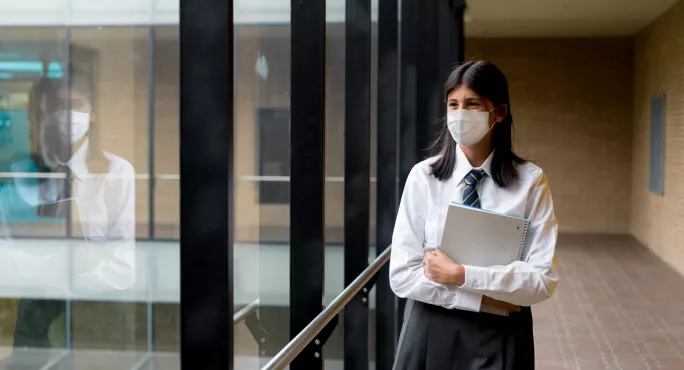- Home
- Mass school Covid tests for teachers: 6 key questions
Mass school Covid tests for teachers: 6 key questions

A select group of Liverpool schools take on huge national significance this week as they begin a mass Covid testing pilot, which could be rolled out across the country if successful.
The schools - 12 secondaries and a special school - have volunteered to take part in the experiment in testing their pupils and teachers for Covid-19, subject to gaining parental consent.
Data: ‘Steep’ rise in Covid among secondary school students
Boris Johnson: Schools will stay open during new lockdown
Coronavirus: Close schools for four weeks, say teachers
But will it work and will it be possible to expand the programme nationally? We look at the main issues involved:
Coronavirus: Who will carry out mass testing in secondary schools?
In Liverpool, the programme is being implemented with the help of the British Army.
Some of the 2,000 soldiers who are already helping with mass testing in the city will be deployed in schools where the testing is set to take place in booths in large open spaces, such as gymnasiums.
The soldiers won’t administer the test but will pass swabs to pupils themselves to swab their own nose and throat before handing it back to the soldier.
Were the scheme to be rolled out to schools nationally, the government has yet to respond on whether soldiers would carry out the tests and whether there would be enough of them to do it. It has also yet to comment on who could do the testing instead.
In Liverpool, the army is picking up most of the work with negligible extra costs for schools, according to Association of School and College Leaders’ union representative Steven Brierley, headteacher of St Margaret’s Academy.
And he said, despite disruption from the testing, workload could reduce as result of the scheme. He said: “If, as a result of better testing, there’s less asymptomatic spread going on in schools then that could lead to the reduction in workload because at the moment I’m spending quite a bit of time organising various self-isolations for positive tests.”
How do you get consent from parents?
Today Liverpool City Council said its response rate on parental consent for the school tests was “good so far”. “Some schools [are] reporting over 90 per cent,” a spokesperson added
However, headteacher Pat Towey, of Broadgreen International School, one of the schools taking part, had said it wouldn’t be possible to gain parental permission for the testing in the normal way due to “challenging and unprecedented circumstances”, and instead proposed that parents would be required to opt out by letter.
But Liverpool City Council was quick to say the letter was inaccurate and that no child would be tested without parental consent.
The school yesterday put an updated consent form on its website in which parents opt in by letter.
It states: “We ask that you and your child discuss this to see if it is something you would like to participate in. If consent is given pupils will be tested twice over a period of about 10 days for Covid-19.”
The episode is perhaps a warning to anyone who thinks that parental consent will be straightforward if school testing is rolled out across the country.
What tests would be used?
Lateral flow tests are being used in Liverpool schools as opposed to PCR tests widely used by Public Health England so far in the pandemic.
While both rely on swabs from the nose and mouth, the lateral flow test produces on-the-spot results within an hour.
The PCR tests, on the other hand, are sent off to a laboratory to find out whether there is an actual Covid-19 infection present in a person.
Will it work?
Although some have criticised lateral flow tests for being less accurate than PCR, the sheer scale of the pilot scheme is giving participants hope.
Positive results will be fed into the track and trace system, so that others in the pupil or teacher’s bubble can be contacted and told to isolate.
Headteacher Steven Brierley said the scheme could be “a game-changer to stop the spread”, and that it was good news for teacher safety with the knock-on affect that fewer would have to take time off work.
Meanwhile, Liverpool’s Calderstones School headteacher Lee Ratcliffe wrote to parents saying: “The size of our school population and the demographics of our staff and students could help to make an enormous difference to this city-wide effort.”
What happens next?
Liverpool City Council says it wants to roll the scheme out to all secondaries, and is also considering rolling it out in primaries. However, one of the challenges is that younger children may find it hard to administer the test themselves.
The spokesman added: “We haven’t made a decision yet on primary schools or how we would do it there.”
Meanwhile, secondary heads in Liverpool are talking about a second phase involving even more secondary schools in the city.
And nationally?
Those taking part in the experiment on Merseyside are clear they are involved in an prototype which could be used to stop the spread of Covid in schools across the country.
Liverpool City Council said the military would be assisted by the city’s school nursing service and that they would be in schools for at least two weeks, after which results of the pilot would be sent to the government for it to decide on next steps. “The government has been clear it wants to learn from this to see if it can be done elsewhere,” a spokesperson said.
Keep reading for just £1 per month
You've reached your limit of free articles this month. Subscribe for £1 per month for three months and get:
- Unlimited access to all Tes magazine content
- Exclusive subscriber-only stories
- Award-winning email newsletters



